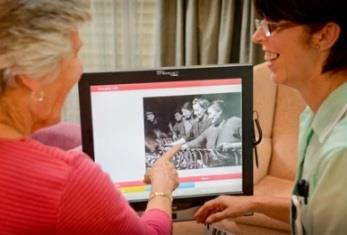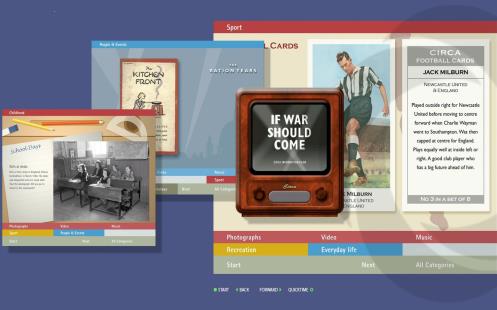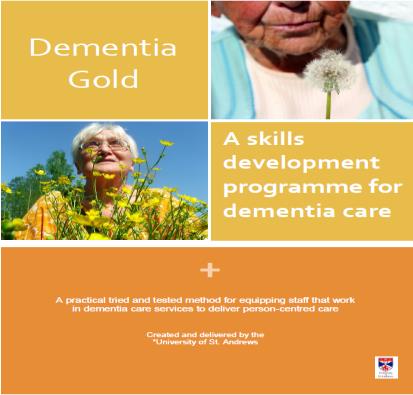CIRCA - a novel technology to support people with dementia
Submitting Institution
University of St AndrewsUnit of Assessment
Psychology, Psychiatry and NeuroscienceSummary Impact Type
TechnologicalResearch Subject Area(s)
Medical and Health Sciences: Clinical Sciences, Public Health and Health Services
Psychology and Cognitive Sciences: Psychology
Summary of the impact
CIRCA, Computer Interactive Reminiscence and Conversation Aid, is
a novel touchscreen computer system designed to support conversation
between people with dementia and their caregivers. CIRCA was based on
research into the memory and communicative problems of people with
dementia. The beneficiaries of this research are: i) practitioners and
professionals in healthcare services, who have improved training and
caregiving relationships - a total of 46 NHS, third sector and private
care organisations from across the UK have installed CIRCA since 2009; and
ii) people with dementia, who have enhanced social interactions and
quality of life.

Underpinning research
The research underpinning CIRCA was conducted by Prof. Arlene Astell
(appointed to the School from 2001-13), Dr Barbara Dritschell (appointed
from 2000 onwards) and an EPSRC-funded research assistant/PhD student,
Maggie Ellis (2002-07, 2008-09), who continued this work in the School as
a postdoctoral researcher, funded by the Alzheimer's Association and the
Technology Strategy Board (2009-13), and is now employed as a fellow in
the School.
Astell, Dritschel and Ellis conduct research on autobiographical
memory, defined as the memory system that stores and retrieves
specific episodes and events in an individual's life. Auto-biographical
memories are based on a combination of biographical information and
personal, episodic memories, alongside more general, semantic memories
about the external world. Such memories are important in developing and
maintaining social bonds, as sharing memories can promote personal
relationships and reminiscing can promote positive social interactions.
The research has shown that performance on autobiographical memory tasks
is impaired in a number of psychological disorders. For example,
individuals with depression exhibit difficulties in retrieving specific
autobiographical memories (Drummond et al., 2006), and individuals with
Asperger Syndrome retrieve fewer specific memories, and take longer to
retrieve these memories, than control subjects (Goddard et al., 2007).
People with dementia also typically suffer from a loss of short-term
autobiographical memory, while retaining long-term memories, and find it
easier to talk about the past rather than recent events.
The researchers hypothesised that deficits in autobiographical memory
play a significant role in others' perceptions of the loss of a sense of
self in dementia. By countering these memory deficits, the researchers
reasoned that perceptions of people with dementia would be enhanced, and
social relationships with others would be improved. Ellis developed the
`Collaborative Personhood Model', which predicted that facilitating
communication with social partners would have positive impacts on
self-image and personhood in people with dementia.
To test this model, the researchers used photographs to prompt
conversations between people with dementia and their interaction partners,
and examined the impact on self-image and personhood. Astell and Ellis
(2006) had shown that people with dementia maintain a strong desire to
communicate with other people and that many aspects of social
interactions, such as turn-taking, remain intact. In addition, the
researchers showed that both people with dementia and their social
partners responded positively to the photographic material (Alm et al.,
2004). As photographs were presented on a touch-screen computer, people
with dementia were able to determine the pace of the conversation and
decided which material to view.

People with dementia were found to initiate conversations about the
material and were more equal partners in the conversations (Astell et al.,
2010). Generic photographs promoted more positive social interactions than
personal photographs, as people with dementia were not always able to
identify people in personal photographs. Importantly, the research
established that imitation between social partners and people with
dementia, and supportive communication techniques, such as adapting to
both verbal and nonverbal cues, enhanced awareness of self and personhood,
even in individuals with severe dementia.
The researchers took their computer-based research tool and developed it
into a system for presenting multimedia reminiscence material -
photographs, videos and music - to people with dementia, in collaboration
with computer scientists and design experts at the University of Dundee
(Norman Alm and Garry Gowans). The resulting CIRCA system arose directly
from their research on autobiographical memory and provided a tool that
could enhance communication between people with dementia and their
caregivers in healthcare settings. The system allows the person with
dementia to choose from a range of subjects from the past, thereby
facilitating their retained long-term memory and providing prompts for
successful conversations.

The researchers worked with practitioners in a major care home provider,
Sanctuary Care, during in the development of the CIRCA system,
which was launched as a commercial product in 2009. The researchers and
practitioners jointly devised protocols for successfully introducing and
maintaining CIRCA into daily practices in care homes. In 2009, funding
from Sanctuary Care allowed trials of CIRCA in care homes to examine
issues relating to the introduction and adoption of CIRCA. This research
contributed to the subsequent development of a training programme, Dementia
Gold, launched by Astell and Ellis in 2012. The training programme
provides practitioners with both hands-on experience of the CIRCA system
and research-led training in how to promote rewarding social interactions
and conversations with people at all stages of dementia.
References to the research
Researchers at the University of St Andrews are in bold;
citations are from Scopus.
Alm, N., Astell, A., Ellis, M., Dye, R., Gowans, G.,
& Campbell, J. (2004). A cognitive prosthesis and communication
support for people with dementia. Neuropsychological Rehabilitation,
14: 117-134. Impact factor = 1.7; citations = 37, doi: 10.1080/09602010343000147.
Astell, A. J. and Ellis, M. P. (2006). The social function
of imitation in severe dementia. Infant and Child Development, 15:
311-319. Impact factor = 1.2; citations = 9, doi: 10.1002/icd.455.
Astell, A. J., Ellis, M. P., Bernardi, L., Alm, N., Dye,
R., Gowans, G., & Campbell, J. (2010). Using a touch screen computer
to support relationships between people with dementia and caregivers. Interacting
with Computers, 22: 267-275. Impact factor = 1.2; citations = 24,
doi: 10.1016/j.intcom.2010.03.003.
Drummond, L. E., Dritschel, B., Astell, A.,
O'Carroll, R. E. and Dalgleish, T. (2006). Effects of age, dysphoria, and
emotion-focusing on autobiographical memory specificity in children. Cognition
and Emotion, 20: 488-505. Impact factor = 2.4; citations = 24,
doi: 10.1080/02699930500341342.
Goddard, L., Howlin, P., Dritschel, B. and Patel, T. (2007).
Autobiographical memory and social problem-solving in Asperger Syndrome. Journal
of Autism and Developmental Disorders, 37: 291-300. Impact
factor = 3.7; citations = 24, doi: 10.1007/s10803-006-0168-0.
Relevant grants since 2001
EPSRC (2001-2004; Alzheimer's Scotland as named partner) `Multimedia
reminiscence experience and conversation support'; £115,210
EPSRC (2004-2007; Alzheimer's Scotland as named partner) `Living
in the moment: developing an interactive multimedia activity system for
people with dementia'; £135,142
Alzheimer's Association (2009-2010) `Prompting to support independence
in dementia'; £85,540
Technology Strategy Board (2011-2013) `Tackling barriers to adoption
of assisted living technology for older adults'; £226,563
Details of the impact
The research on collaborative communication between people with dementia
and interaction partners, which led to the development of CIRCA, has
impacted on: i) practitioners and professionals in health care
services, who provide an enhanced quality of service as a result of
CIRCA and specialist training courses designed by the researchers; and ii)
individuals with dementia, who have enhanced quality of life and
well-being, with concomitant benefits for families.
i) Impact on practitioners and professionals in health care services
Astell and Ellis' research has had a positive impact on practitioners and
professional practice through: a) instillation of CIRCA into a broad
range of care home settings, b) the development and delivery of
staff training programmes, c) dissemination of the research to
professionals and practitioners, and d) broader dissemination of
the research to the general public.
a) Instillation of CIRCA into care home settings
CIRCA was initially commercialised in October 2009 through a non-exclusive
licensing agreement between the Universities of St Andrews and Dundee with
Dementia Life, a newly formed company that sold CIRCA to the care
home market. The licensing agreement was terminated in December 2010 and
the research team established a new company, CIRCA Connect (http://www.circaconnect.co.uk).
In total, CIRCA units have been installed into 46 care home and
dementia care organisations around the UK; more specifically, the
system has been adopted by 12 NHS/Council-run residential care homes
or care centres (e.g., Argyl and Bute Council, Camden Council,
Gloustershire NHS Foundation Trust, South London and Maudsley NHS
Foundation Trust), 25 private residential care homes (e.g.,
Sanctuary Care) and 9 charity/not-for-profit day-care centres or
residential homes (e.g., Age Concern, Alzheimer's Scotland)
(Supporting evidence, S1). In March 2013, the researchers signed a
marketing agreement with Paul James Contracts Ltd to supply CIRCA
direct to care homes.
b) Staff training programme In May 2012, Astell and
Ellis launched a skills-based staff training programme, Dementia GOLD,
which they designed for professional caregivers of people with dementia.
The training programme is based on their research findings and extensive
hands-on experience of communicating with dementia sufferers. The training
programme has already been adopted both in the UK (six trainees, Partridge
House Care Home, Anchor Trust, Brighton, 2012; S6) and in mainland
Europe (nineteen trainees, Compassion Alzheimer, Bulgaria, a
non-governmental support organisation, 2012; S2). The CEO of the
organisation in Bulgaria has stated that:
`The training has helped the most in creating relationships based on
caregivers' tolerance which has ... influenced the wellbeing of people
with dementia', and the training `has also helped the
relationships among caregivers to become stronger, caregivers became
more sensitive not only towards their clients but towards each other.'
(S2)

c) Caregiver education Since 2008, Astell and Ellis
have given numerous invited talks on their research at practitioner
conferences and have spoken at events for family carers and medics, e.g.,
Intensive Interaction Annual Conference, Leeds (2010); Scottish
Caring and Dementia Congress, Edinburgh (2011); Dementia
Services Information and Development Centre, St James's Hospital,
Dublin (2011) (S7). Since 2012, CIRCA has been on display in the
Design and Technology Suite at the Dementia Services Development
Centre in Stirling, as an example of technology that can improve the
lives of people with dementia, and this Centre receives an average of 200
visitors per month (S3). Astell and Ellis have also written
articles for publications aimed at practitioners (e.g., S8).
d) Broader dissemination Further evidence of impact
can be seen in the media coverage that the research has attracted both at
home and abroad as an aid for families and dementia care providers. The
research has been disseminated by news and technology broadcasters (e.g.,
BBC, S9), and the researchers have given public talks and engaged
in public debates, e.g., Alzheimer's Public Debate, Ninewells
Hospital, Dundee, 2011 (S4).
ii) Impact on quality of life and well-being of people with dementia
The impact of CIRCA on the quality of life and well-being of people with
dementia and their families is summed up in the following quote from the
Unit Manager of a residential care home, which states that CIRCA has:
`helped to restore a sense of dignity and respect to some of our
frailest people. They are able to interact more confidently with their
loved ones and staff as past experiences and memories are un-locked. It
is heartening to observe what appears to be an improvement in
self-confidence after sessions with the system' (S5),
and `the ability to converse with other residents and their families
is improved after using CIRCA', and that CIRCA is a `useful tool
which can help open up conversations and enable [people with dementia]
to interact with their loved ones much more freely. This contributes to
making visits a much more positive and fulfilling experience for all.'
(S5)
For both people with dementia and their caregivers, the benefits of
enhanced training are nicely summed up as follows: `To see residents
using it suddenly come alive, and find their own words to express
themselves and share memories, is such a reward, for both the carers who
want to make conversation and help [people with dementia] to have a
better life, and of course their relatives - as they can see them come
back to being more like their old selves.' (S10)
Sources to corroborate the impact
S1 Written confirmation from Director, CIRCA Connect, of
instillation of CIRCA into 46 residential or day-care settings, including
the specific examples listed.
S2 Written confirmation from CEO of Compassion Alzheimer,
Bulgaria, of the impact of the Dementia Gold training on practioner skills
and practices.
S3 Written confirmation from the Library & Information Service
Manager, Dementia Services Development Centre, Stirling, that CIRCA is
housed at the centre and visitor numbers.
S4 Written confirmation of Astell's participation in public debate
from ARUK East Central Scotland Network Centre coordinator of
participation in Alzheimer's Public Debate.
S5 Written confirmation of quotes from Unit Manager, Eadar Glinn
residential care home, Oban.
S6 Documented evidence of Dementia Gold training event at
Partridge House Care Home, Brighton.
S7 Event programmes corroborate Astell and Ellis' outreach to
professional caregivers.
S8 Example of outreach in a journal aimed at professionals working
with people with dementia: Astell, A. J., Alm, N., Gowans, G., Ellis, M.,
Dye, R., Campbell, J., & Vaughan, P. (2009). Developing technology to
meet psychosocial needs. Journal of Dementia Care, 17, 36-38.
S9 Evidence of research dissemination in the media, http://news.bbc.co.uk/1/hi/8598208.stm.
S10 Corroboration of quote: http://www.carehome.co.uk/news/article.cfm/id/1558824/residents-with-dementia-come-alive-and-unlock-memories-through-innovative-touch-screen-system